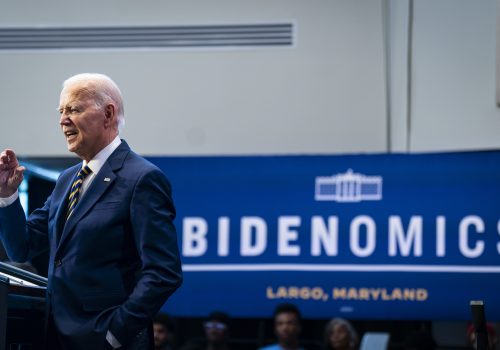A new US economic playbook to lead the world economy and counter China
The United States and China, the world’s two leading economies, are engaged in an unprecedented competition to shape the norms and rules of the world economic and political order. US economic resilience and security is predicated on winning this competition. In service of this goal, the US House Select Committee on the Strategic Competition between the United States and the Chinese Communist Party has offered a valuable bipartisan blueprint.
The Select Committee’s report, published in December with minimal fanfare, proposes that the United States reset the terms of economic relations with the People’s Republic of China (PRC), prevent US capital and technology from aiding China’s military buildup and human rights violations, and build US technological leadership alongside allies and partners. This bipartisan blueprint, though not perfect, is a useful foundation for US policy toward the PRC for the next Congress and the next administration—regardless of who wins the November elections.
The authors of this article come from different political perspectives, but we agree that it’s time for a comprehensive economic strategy to advance US interests and deter the PRC’s ability to do them harm. Building on the Select Committee’s work, here are eight principles to inform a comprehensive playbook.
1. Be affirmative, agile, and systemic
Defense alone is not enough to prevail in the United States’ strategic competition with the PRC. The economic playbook needs to be affirmative in its outlook, agile in its execution, and systemic in its analysis. Those qualities will be required to simultaneously strengthen the US industrial base, foster innovation and new technologies, and pursue a positive economic agenda with partners and allies while taking the necessary defensive actions.
2. Get industrial policy right
Policymakers should look to history and geopolitics to develop a prudent two-pronged approach to industrial policy that focuses on strengthening the US domestic manufacturing base in targeted sectors (e.g. semiconductors) and investing in innovation and broad industrial infrastructure and training. Investment in research and development and a favorable tax and regulatory environment may be more effective than direct subsidies, which, although potentially needed in narrow circumstances, are more susceptible to industry capture and extra-economic considerations.
3. Arrest the PRC’s market distortions and manipulations
The PRC has not lived up to the commitments it made when it joined the World Trade Organization (WTO) in December 2001. Nowhere is this more obvious than with respect to the PRC’s brazen and persistent excess capacity in electric vehicles, solar panels, steel, semiconductors, and pharmaceuticals, just to name a few. It is imprudent for the United States to afford China the same tariff treatment as other WTO members. However, merely revoking the PRC’s permanent normal trade relations status and reverting to Smoot-Hawley tariffs would be inefficient, outdated, and counterproductive. The Select Committee report puts forth a more sophisticated and effective approach by creating a new tariff column for China and renewing certain WTO safeguard mechanisms. This offers a promising foundation for a more modern and modulated trading framework with the PRC and should be put in action in close coordination with Group of Seven (G7) and Quadrilateral Security Dialogue members.
4. Stop US capital and technical knowhow from aiding the adversary
Export control measures on semiconductors and other advanced technologies put forth by the Biden administration and Congress to thwart the PRC’s military modernization are an important start. Next should come screening of outbound investments to prevent US investors from unintentionally aiding China’s military and human rights violations. This calls for a modulated approach involving both specific entities and sectors. Additionally, the US government should work with domestic and allied academic and research institutions on a principled, pragmatic, and robust cross-border research protocol to preclude the PRC’s intellectual theft and unauthorized technology transfer.
5. Pursue a positive economic agenda with partners and allies
Punitive measures such as tariffs, investment restrictions, and export controls are necessary but insufficient for winning the strategic competition. A positive economic agenda with partners and allies is needed to incentivize the private sector—both in the United States and overseas—to diversify important supply chains away from China. The Select Committee report promotes bilateral trade negotiations with Taiwan, the United Kingdom, and Japan based on the high standards set out in the US-Mexico-Canada trade agreement. If a new free trade agreement is practically or politically challenging, the report suggests targeted agreements with trusted trade partners in areas such as the medical sector or critical minerals. As part of this effort, a comprehensive review and modernization of the Bretton Woods institutions to better reflect geoeconomic realities is urgently needed.
6. Win the transition to the green economy
The road to the green economy rests wholly within the geopolitical and geoeconomic contest between the United States and the PRC. The United States should leverage its substantial advantages over the PRC in traditional and renewable energy and technology to address the immediate energy security needs of its partner nations while also offering them a credible energy transition toward a greener economy.
To ensure that its energy supply chains remain secure and that it remains energy independent, the United States should aggressively pursue sectoral agreements and minerals security partnerships recommended by the Select Committee report. Furthermore, the United States should remain vigilant against climate engagement with the PRC without due reciprocity and must avoid unwittingly facilitating the PRC’s declared intent to monopolize and dominate future green industries.
7. Set the trends around standards for the digital economy
As the world’s largest digital economy, the United States bears the responsibility to articulate the rules, norms, and practices of digital governance—including over artificial intelligence—that favor Western values over China’s model of censorship and control. The United States must lead on digital standards in order to keep its superiority in technology and financial markets.
8. Modernize US policies, instruments, and institutions
Unlike defense and diplomacy, there is no identified lead US agency to engage and prevail in the economic competition with the PRC. The diverse and often discordant set of economic policies, instruments, and institutions engaged in the effort are frequently found wanting in both efficacy and efficiency. In short, US institutions are underprepared for the complexity of economic competition with the PRC. The United States has a long history of modernizing its government levers to address the challenges it confronts, from the 1986 Goldwater-Nichols legislation to reinforce the military chain of command after problems surfaced during military operations in Iran and Grenada, to post-9/11 reforms to federal intelligence and law enforcement agencies. A similar endeavor is needed to improve US economic diplomacy, coordination, and engagement.
Prevailing over the PRC in economic competition calls for total national commitment and engagement. It requires a comprehensive, nuanced, and tailored playbook utilizing not only the proverbial hammer and scalpel, but all the multipurpose tools in the toolbox. The Select Committee has done the nation a service by unequivocally identifying the PRC as an adversary and a rival, and it put forth a useful framework with pragmatic recommendations to bolster national economic security. Its report represents a useful transition from the initial chapter prioritizing industrial policy and tariff measures to the next chapter of working with allies and partners to prevail in the global marketplace.
Domestic prosperity depends on the United States leading the global economy. Now is the time to develop and execute a new US economic playbook to maintain that lead.
Kaush Arha is a nonresident senior fellow at the Atlantic Council’s Global China Hub and previously served as the senior advisor for global strategic engagement at USAID and the G7 Sherpa for the Blue Dot Network during the Trump administration.
Peter Harrell is a nonresident senior fellow at the Carnegie Endowment for International Peace and previously served as senior director for international economics with a joint appointment to the National Security Council and National Economic Council during the Biden administration.
Clete Willems is a nonresident senior fellow at the Atlantic Council’s GeoEconomics Center and previously served as deputy assistant to the president for international economics and deputy director of the National Economic Council during the Trump administration.
Further reading
Thu, Feb 1, 2024
Why 2024 will be a big year for positive economic statecraft
Econographics By Nicole Goldin
As geopolitics cast a shadow on the global economy, leaders are looking to build resilience, advance inclusive growth, and promote stability and security. Three January events already showcase that these positive economic statecraft (PES) approaches are clearly in effect this year.
Tue, Oct 24, 2023
Bidenomics invites a global economy full of fences, to the United States’ detriment
New Atlanticist By Kaush Arha
Instead of hiding behind its own fences, the United States is better served rallying the world in fencing off Chinese economic coercion.
Wed, Sep 20, 2023
The US, EU, and UK need a shared approach to economic statecraft. Here’s where to start.
Report By
The economic statecraft landscape is becoming more complex as transatlantic partners increasingly leverage the tools to counter transnational threats. There is a growing need to understand how these tools are used, by whom, and when, as well as their intended and real impacts worldwide.
Image: Workers weld at a factory floor in Columbus, Ohio, U.S., March 26, 2024. REUTERS/Carlos Barria


